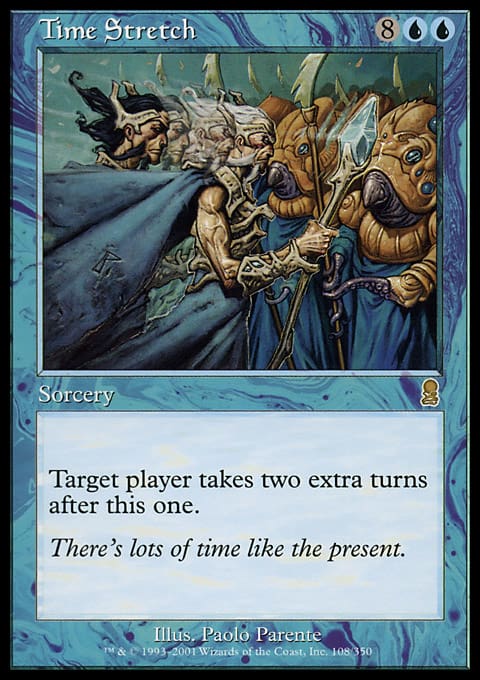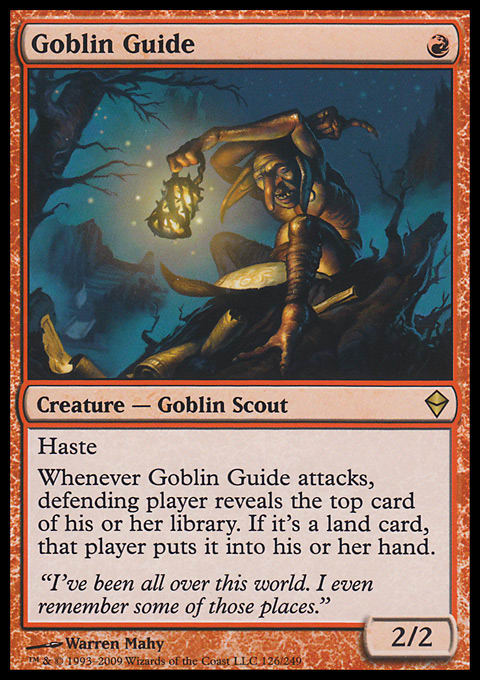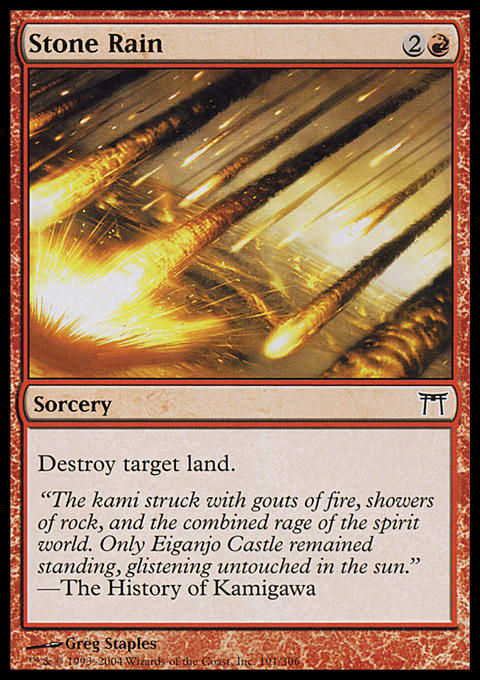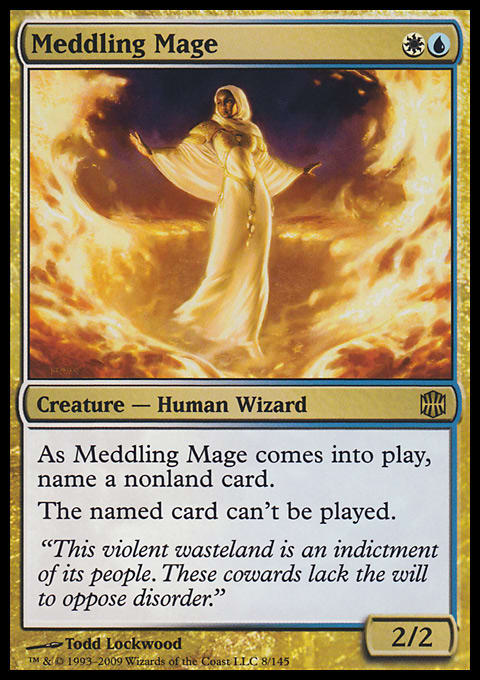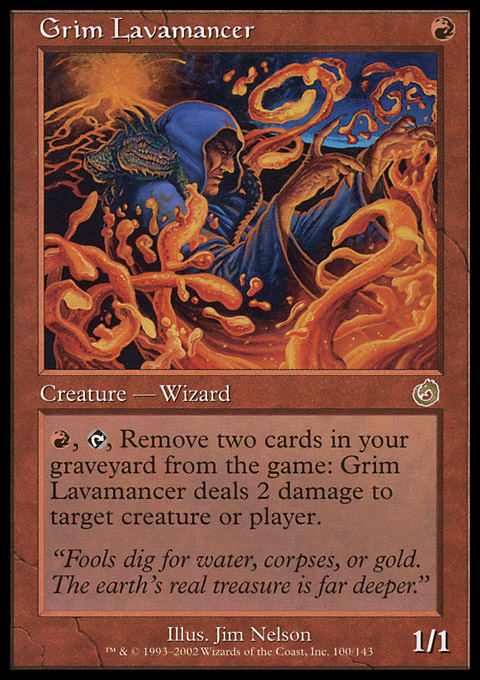I was planning on writing about my model for Grand Unified Theory this week, but Adrian Sullivan’s comments in my article last week made it clear to me that I need to do this article first. It’s clear to me that one of the following has happened since I began developing this model.
- I’ve unknowingly redefined the way I think about time, and thus the way I think about Magic.
- I’ve always thought about time and Magic this way, and I’ve only recently been able to express it.
Regardless, without understanding, my perception of time and how it operates in the game of Magic, you won’t understand my model, as the concept of time is integral to how my model functions. For me, the terms “tempo” and “time” are interchangeable. To me, they refer to the same game ideas and game concepts, but in an attempt to avoid conflating my ideas with existing Magic terminology, I will use the term “time” throughout this article as opposed to “tempo” because the former has much less connotation in a Magic sense than the latter.
What Is Time?
To quote Patrick Chapin in Next Level Magic, “Tempo deals with the resources that you gain every turn, but do not possess initially.” This is an accurate description of what the concept of time deals with, but how do we apply this to Magic?
First, we ask ourselves the question: What are the resources that we “gain every turn but do not possess individually”? The answer, albeit a bit circular, is simple: turns. However, this idea isn’t very practical to apply. How do we turn this from an abstract concept into something practically utile when we are faced with various game states and play lines to think about?
Well, to answer this question, let’s take a look at a different game: chess. If we apply Chapin’s concept in chess, we find that a chess turn consists of only one item: the movement of one of your pieces from one square to another. This is more commonly known as a move. Thus, in chess, the move is synonymous with the turn because they are one and the same thing. So, if you cause your opponent to waste a move by responding to an otherwise productive move that you make, you have gained an advantage. This is exactly how it works in chess.
So, how do we extend this concept to Magic? How does the principle of time interact with our game? The answer is really in the same place: turns. The goal is the exact same as it is in chess: to deny our opponents the value generated from a single turn; in other words, to waste their turns. The important thing to realize here is that the advantage is a relative one. It actually doesn’t really matter where we are in an absolute sense with respect to time. It matters where we are relative to our opponent. Thus, as long as we are ahead of our opponent in turns, it doesn’t actually matter where in time we are—we have a time advantage.
We run into a problem, however, looking at Magic—the Magic turn is far more complicated and features far more elements than the chess turn. So, we have to identify what it is we are looking at, what resources we are concerning ourselves with. Thus, we look at what the Magic turn gives us:
- Untap Step — Refreshes permanents, primarily lands, for use in the next turn cycle.
- Draw Step — One new card to use
- Main Phase — Ability to deploy new permanents and make a land drop
- Combat Phase — Ability to attack and do damage to an opponent
As is always the case with Magic, cards can modify this, but this list of items is what the game guarantees you access to every turn.
Now, we’ll set aside the draw step for two reasons. First, it doesn’t fit our working concept because we begin the game with cards. Second, the concept of cards is better covered by card advantage, so we will leave that alone. This doesn’t mean that cards don’t interact with time; they actually do, but that is a discussion for a different time.
This leaves us three main items within the turn: the untap step, the main phase, and the combat phase. I’m going to tell you right now that I’m separating land drops from this, largely because you miss them more frequently than any of the above parts of the turn. This leaves us with the untap step, the main phase, the combat phase, and the land drop. These are the four elements, or renewable resources, that Magic provides us with. These are the four central ways in which time interacts with the game of Magic.
What Is a Time Advantage?
Before I talk about time advantage specifically, I want to discuss some principles of advantages in general.- Advantages be can small to the point of irrelevancy.
- Advantages can be large enough to be effectively insurmountable.
- The value of any advantage, assuming inaction on the part of the holder, will dissipate over time.
Remember these three basic principles as we proceed forward looking at time advantage.
Now, let’s move on to the subject at hand. A time advantage is an advantage in any of the resources associated with time. This means generating extra land drops, main phases, combat phases, and untap steps generates a time advantage (although not always a relevant time advantage). You can do this one of two ways: by nullifying an opponent’s land drop, main phase, combat phase, or untap step, or by generating an extra one of those for yourself. Let’s take a look at some examples.
The most basic representation of time advantage we have in Magic is the play-or-draw rule. Why do we have it? Why must you choose play or draw? Why can’t you do both? The reason is that there is a built-in advantage to being on the play. Many people recognize this, and that is why, given the choice to play or draw, the majority of Magic players still choose to play despite the stress our community places on card advantage. Whether this decision is correct is outside the scope of this article, but this fact alone forces the recognition that there is an inherent advantage to playing first.
What is this inherent advantage? Well, it’s a time advantage. In effect, if you play first, you are starting a half-turn ahead of your opponent because you get to make the first land drop, make the first play, and make the first attack. Because of this, you have the first opportunity to increase an advantage, which is valuable in and of itself. Of course, your first untap step has no value, as there is nothing to untap, and your first combat phase has minimal value (it’s only useful if you have haste creatures). Therefore, the primary value of being on the play comes from being able to make your land drop first and play cards during your main phase first.
There’s a reason that cards like Birds of Paradise and Goblin Guide are stronger on the play than on the draw, and that is because when played early, they help compound the initial time advantage you receive from being on the play in the first place. This shows us that even within a game in which players are able to do the same thing, there is value in being able to do something before your opponent is able to do that same thing.
In much the same way, Rampant Growth represents some time advantage as well. Since there is value in making your first land drop before your opponent, why would there not be value in making your third earlier? Rampant Growth allows you to make your third land drop (and every subsequent land drop you don’t miss) before your opponent no matter the circumstances. Once again, this is a time advantage, and there is some degree of value in this (how much advantage can be debated).
But you can also generate a time advantage by denying your opponent the use of those same resources. Let’s take a look at some examples of that in action.
Firstly, let’s look at Mistbind Clique. Mistbind Clique can deny much of the value of your opponent’s untap step. By playing it during your opponent’s upkeep, you reduce the value of his untap step to nonland permanents he controls and instants that can be cast profitably during his upkeep. In doing so, Mistbind Clique also denies your opponent the vast majority of his main phase, if not all of it. Thus, when you play Mistbind Clique, you are often guaranteed to deny your opponent two aspects of his turn. Combine that with the fact that the 4/4 part of Mistbind Clique can easily make attacking not profitable, and you can see how Mistbind Clique often results in a virtual Time Walk. In many situations, Mistbind Clique will be capable of denying your opponent most, if not all, the relevant aspects of his turn, essentially denying the opponent the entire turn, resulting in what is effectively a Time Walk for you.
Let’s look at another aspect of time advantage: Stone Rain. We’ve already covered how Rampant Growth is worth an extra land drop, so you can see how Stone Rain’s time component is that of denying your opponent a land drop. However, it may not be the land drop that you think. If I cast Stone Rain on your third land, the land drop I am actually denying is your fourth, not your third. This is the critical difference between Rampant Growth and Stone Rain. Essentially, Stone Rain delays the spell that you would have normally been able to cast; thus, it delays the spell that you would have spent 4 mana on. Sometimes, you get lucky and deny the third land drop as well because your opponent is not holding a land, but you can’t assume that as the player playing the Stone Rain. You play Stone Rain on your opponent’s third land to deny his fourth land drop–not his third.
Having talked about Stone Rain, I think you can see how Thalia, Guardian of Thraben works with respect to time advantages as well. In decks that play it, Thalia tends to act as a proactive Stone Rain, delaying your opponent’s spells by one turn. The actual land drop denied is not the same as Stone Rain, but we won’t get into that technicality. The point is that it results in a time advantage of some sort.
I want to reiterate that the fact that you have a time advantage doesn’t mean it’s a relevant advantage or that you should be focusing on it. I just want you to recognize that it is there, so that if the need arises for you to exploit it in some way, you have the ability to do so. Remember that a time advantage exists if you have an aggregate advantage across the four resources that time relates to: untap step, main phase, land drop, and combat step.
Controlling Time
Logically, controlling time should refer to the ability to control any of the resources associated with time. What does this mean, though? Obviously, a direct attempt to control the appropriate resources affects time, but it’s important to note that indirect attempts to do so also affect time. What’s important is the net effect of the exchange and not the actual exchange.
Let’s take a look at a few more examples of this principle in action.
Consider what happens if your opponent has two Faerie Invaders in play and you play a Sentinel Spider. Your opponent can’t really attack with his Faerie Invaders, thus, you are effectively denying him use of his combat step. This can, of course, change very quickly, but Sentinel Spider is affecting time because it is affecting your opponent’s ability to use his combat step. This advantage may be tenuous, but it is an advantage you can take advantage of.
Now, let’s look at a different way of controlling the effect of a phase: Vapor Snag or Mana Leak. Let’s say your opponent taps out on his turn for Wolfir Silverheart. If you Mana Leak or Vapor Snag it, you’ve generated time advantage. How? Once again, you’ve denied him aspects of his turn, namely, his untap step and his main phase. Because he spent all his mana on a card that amounted to nothing, you’ve successfully denied him the mana aspect of his untap step. He can still use other permanents he’s untapped, but the lands he untapped are no longer available, so that’s the gain there. You’ve also denied him his main phase—without mana, he probably can’t deploy more threats or permanents, thus making it as though he never had a main phase in the first place.
Connecting Time to Existing Theory
So, how does time relate to our existing concepts? How does it tie together what we already know and have developed? After all, an isolated concept isn’t very useful. So, what I’m going to do now is tie this new view of time into three main existing concepts to showcase how everything works together.
Virtual Card Advantage
In many situations, virtual card advantage is a reflection of time advantage. Why? Well, first, what is virtual card advantage? Virtual card advantage is produced when you reduce the effective card quality of you opponent’s cards by limiting their utility in some way shape or form (but not by outright destroying the card). So, how does this relate to time?
The answer lies in the typical method for reduction in card quality. This often (but not always) occurs in one of two ways: preventing an opponent from casting a spell or preventing a creature from being effective in combat. Let’s take a look at these in more detail
- Preventing an opponent from casting a spell — There are two main ways of doing this: controlling your opponent’s mana or controlling the spell directly (e.g. with Meddling Mage). Either way, what you are doing is controlling a resource related to time. If you are controlling his mana, you are denying him the value of his untap step, as he will be unable to effectively use the mana that refreshes every turn. If you are controlling the spell directly, you are denying the value of his main phase, as he is unable to wield that spell against you.
- Preventing a creature from being effective in combat — When you are on the defensive, this obviously decreases the value of your opponent’s combat phase, and thus generates a small time advantage for you. However, this is even effective on offense. Why? Because if you are attacking and nullify one of your opponent’s creatures, you increase the value of your own combat phase. Remember that time is a relative advantage, and an increase in your related resources is also a time advantage.
Stage Theory
Stage theory is fundamentally about development, and development is a complete reflection of time. Why? Comparative development is entirely a function of how effectively you have been able to use your turns and how effectively you have been able to deny your opponent use of his turns. Thus, the concept of time covers the ideas of development that stage theory presents.
Stage theory is still useful in understanding what a player’s development is relative to his game plan, but once again, the entire idea of development—which stage theory represents—is covered entirely by the concept of time and the usage and denial of turns or parts of turns.
The Philosophy of Fire
This is perhaps the most interesting one. How does time connect to the Philosophy of Fire? The answer is simple. The Philosophy of Fire is based upon applying pressure to the opponent (generally via his life total) and forcing him to respond on your terms. If he doesn’t have the appropriate responses, he will lose.
This is turn pressure in a different way. By artificially limiting the number of turns an opponent has to accomplish any given goal, you force him to work with the resources he has at hand, which are sometimes insufficient. In essence, you deny him the turns to comfortably do what he wants to do. Once again, the key here is overall turn pressure, which is the basis of the concept of time.
In essence, the Philosophy of Fire focuses on the quality of time as opposed to the quantity of time, which may seem counterintuitive at first. However, what actually happens is the Philosophy of Fire being very efficient at taking full advantage of its own turns, thus forcing the opponent to have similar turn efficiency. It does this by threatening to win on a specific vector, thus forcing the opponent to defend that same vector. The basic principle is not, “Let me try to deny you time or create time,” but instead, “Let me force you to not waste time.”
The key thing here is the idea of wasted time. Wasted time is time that is not spent productively. In essence, you waste time if you are doing something that the opponent can successfully ignore you doing. This is normally not an issue, but waste enough time, and you end up at a time disadvantage. The Philosophy of Fire is best at punishing an opponent for wasting time. This is actually an effective philosophy because very few decks are built to take complete advantage of their early turns, even when the vector of attack is a common one (creatures), never mind a stranger one (Dredge).
Conclusion
In the end, controlling time is about controlling turns—if you deny your opponent turn or portions of turns or generate extra turns or portions of turns, you are creating a time advantage. However, the fact that you created an advantage doesn’t mean it’s a relevant advantage. Time is something that fluctuates greatly. Time advantage can swing wildly from one side to another based on a single play or a small series of plays. However, recognizing when you have a time advantage is important, as you need to be able to seize it.
Remember that the idea of time is completely relative. Your time is measured with respect to your opponent’s time, and that is it. How far ahead or behind you are is not measured against the development of your own game plan, but against the development of your opponent’s game plan. Basically, if you think of a game plan as a progress bar, it doesn’t matter if you are at 25% when you should be at 50% as long as your opponent is at under 25%. If your opponent is at under 25%, it doesn’t actually matter how far behind your normal you are—you are still ahead.
Where this becomes hairy is when you have to make decisions about whether to seize your time advantage or whether—at the current state of the game—your opponent has a larger potential to gain time advantage than you, but that is outside the scope of this article. The idea of time is actually capable of connecting a variety of disparate ideas we have in Magic. While it doesn’t explain everything always, it does give us far more than most people realize.
I hope this has been a useful elaboration on the concept of time and how it impacts Magic.
Chingsung Chang
Conelead most everywhere and on MTGO
Khan32k5 at gmail dot com














